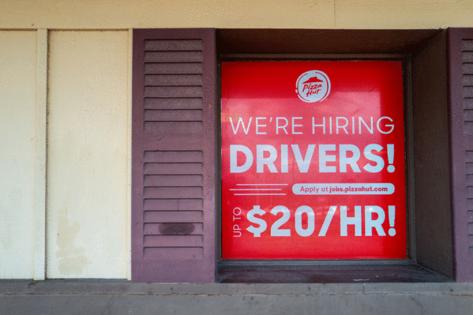Commentary: Fewer teens are working--and missing out on the skills needed to succeed
Published in Op Eds
As an older millennial, my high school and college summers were defined largely by the jobs I held. Not many of today’s teens can say the same.
Once a rite of passage, teen jobs are now endangered: just 35% of 16- to 19-year-olds worked last summer, down from 54% in 2000.
Big deal? Yeah, it is. This decline in youth employment matters more than we may think.
My only purpose in working as a teen was to earn as much money as possible, but I now realize that the experience and life lessons those jobs provided were far more valuable than the money I earned.
Low-wage, entry-level jobs provide the perfect opportunity for youth to learn the importance of key skills: showing up on time, getting along with co-workers, demonstrating respect and kindness towards customers who may lack both, and staying on task even when it is difficult or boring.
Learning these skills early has long-run benefits. Multiple studies link part-time work during high school to higher future wages and occupational status, and more consistent employment.
For example, Christopher Ruhm and Charles Baum found that teens who held part-time jobs realized 7% higher future earnings than their peers who did not work. And Jeremy Staff and Jeylan Mortimer found that teen employment is “a key formative experience, which establishes patterns of schooling and working that persist during the succeeding years.”
In today’s digital world, jobs that require teens to disconnect from screens and interact face-to-face mean more time engaged in the real world around less time extricated in virtual naivete.
With recent data such as the Understanding America Study noting what many educators and employers already perceived as a disturbing decline in conscientiousness among teens and young adults, teen jobs provide one way to help reverse what scholar Samuel J. Abrams describes as “the quiet unraveling of a trait that built civilization.”
Conscientiousness is generally associated with tendencies to be careful, disciplined, persistent and dependable. It’s one of the “Big Five” personality traits used in psychological testing and is associated with greater success in school, work, and relationships, as well better physical, mental and financial well-being.
In a commentary on the Understanding America Study, Abrams notes:
“Between 2014 and 2024, conscientiousness scores among Americans aged 16-39 dropped more sharply than any personality shift in recorded history. Younger cohorts report feeling 20% more distracted and careless than just a decade ago. They demonstrate less tenacity, make fewer commitments, and struggle to follow through on the ones they do make. Most alarming: the steepest declines occur during the transition from adolescence to early adulthood—precisely when character traits typically solidify for life.”
While more teen jobs are not a cure-all, they require—and thus teach—what teens are often missing.
But how can we get more teen jobs? The government can start by not raising the employment bar so high that inexperienced teens can’t reach it.
The recent plunge in teen employment occurred during the Great Recession, which coincided with dozens of state minimum wage hikes and a federal minimum wage increase. The teen unemployment rate hit a record 27.2% in 2009 and 2010 and remained above 20% for six straight years from 2008 to 2014. That lack of opportunities naturally led many teens to give up the notion of work, contributing to sustained low levels of teen employment.
Today, 10 states and the District of Columbia have minimum wages of $15 or more and multiple cities in Washington state mandate over $20 per hour. Most teenagers can’t create that much value right out of the gate.
In addition to wage mandates, government mandates that force employers to provide health insurance, vacation, paid family leave and other costly benefits can further dissuade employers from hiring teenagers, while restrictions on the types of jobs teens can perform and the hours they can work can also preclude their employment.
Policymakers should help make teen jobs great again by removing barriers that make it harder for teens to earn, learn and improve themselves.
This Labor Day, it’s time to help more teens share in the fruits of work, becoming more conscientious and successful adults as a result.
____
Rachel Greszler is a Senior Research Fellow in Workforce and Public Finance at the Heritage Foundation.
_____
©2025 Tribune Content Agency, LLC.
























































Comments